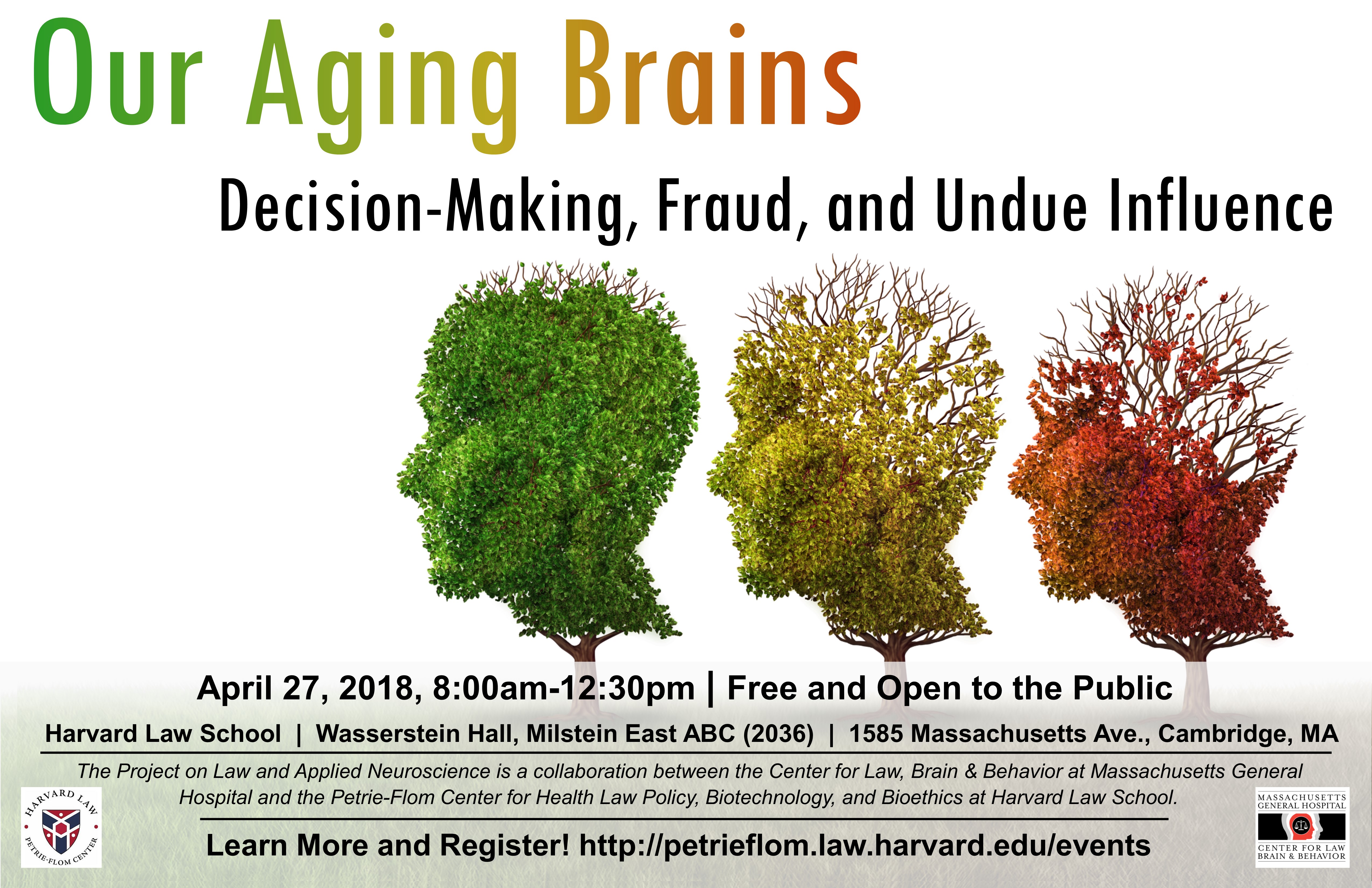
With over 70 million Baby Boomers retiring, elder financial exploitation has been labeled the “Crime of the 21st Century.” In this half-day event, we will explore the neuroscience, psychology, and legal doctrine of financial decision-making in older adults. How does the aging brain make financial decisions, and when is it uniquely susceptible? How can courts best use science to improve their adjudication of disputes over “competency”, “capacity”, and “undue influence”? Is novel neuroimaging evidence of dementia ready for courtroom use? This conference will bring together experts in medicine, science, and law to explore these important questions and chart a path forward for dementia and the law.
Agenda
8:00 – 8:30am, Registration
A continental breakfast will be available.
8:30 – 8:45am, Introduction
- Judith G. Edersheim, JD, MD, Co-Founder and Co-Director, Center for Law, Brain & Behavior at Massachusetts General Hospital; Assistant Professor of Psychiatry, Harvard Medical School; attending Psychiatrist, Department of Psychiatry, Massachusetts General Hospital
- Carmel Shachar, JD, MPH, Executive Director, Petrie-Flom Center for Health Law Policy, Biotechnology, and Bioethics and Lecturer in Law, Harvard Law School
- Francis X. Shen, JD, PhD, Senior Fellow in Law and Applied Neuroscience, the Petrie-Flom Center in Health Law Policy, Biotechnology, and Bioethics, Harvard Law School and the Center for Law, Brain & Behavior at Massachusetts General Hospital and Associate Professor of Law and McKnight Land-Grant Professor, University of Minnesota Law School
8:45 – 9:30am, What is Dementia? Definitions, Diagnosis, and Treatment
- Bruce H. Price, MD, Chief, Department of Neurology at McLean Hospital; Associate in Neurology, Massachusetts General Hospital; Associate Professor of Neurology, Harvard Medical School; Co-Founder and Co-Director of the Center for Law, Brain & Behavior, Massachusetts General Hospital
9:30 – 9:45am, In Pursuit of Elder Justice
- Phillip Marshall, PhD, Elder Justice Advocate and Founder, Beyond Brooke
9:45 – 10:00am, Break
10:00 – 11:15am, Dementia and the Law: Challenges and Opportunities
- Jennifer A. Moye, PhD, Professor of Psychology, Department of Psychiatry, Harvard Medical School; Associate Director of Education and Evaluation, New England Geriatric Research Education and Clinical Center, Boston and Bedford VA
- Ray D. Madoff, JD, Professor, Boston College Law School
- Peter A. Lichtenberg, PhD, ABPP, Professor, Department of Psychology and Director, Institute of Gerontology, Wayne State University
- Daniel Marson, JD, PhD, Professor in the Department of Neurology at the University of Alabama at Birmingham (UAB).
11:15am – 12:10pm, Future Directions: The Aging Brain and Financial Decision-Making
- Gregory Samanez-Larkin, PhD, Assistant Professor of Psychology and Neuroscience, Duke University
- Duke Han, PhD, Director of Neuropsychology, Department of Family Medicine and Associate Professor of Family Medicine, Neurology, Psychology, and Gerontology, Keck School of Medicine, University of Southern California
- Judith G. Edersheim, JD, MD, Co-Founder and Co-Director, Center for Law, Brain & Behavior at Massachusetts General Hospital; Assistant Professor of Psychiatry, Harvard Medical School; attending Psychiatrist, Department of Psychiatry, Massachusetts General Hospital
12:15 – 12:30pm, A Path Forward
- Francis X. Shen, JD, PhD, Senior Fellow in Law and Applied Neuroscience, the Petrie-Flom Center in Health Law Policy, Biotechnology, and Bioethics, Harvard Law School and the Center for Law, Brain & Behavior at Massachusetts General Hospital and Associate Professor of Law and McKnight Land-Grant Professor, University of Minnesota Law School
The Project on Law and Applied Neuroscience is a collaboration between the MGH Center for Law, Brain & Behavior and the Petrie-Flom Center for Health Law Policy, Biotechnology, and Bioethics at Harvard Law School.
Watch a video of this event:



